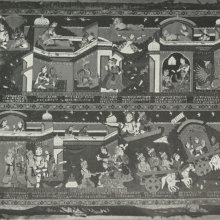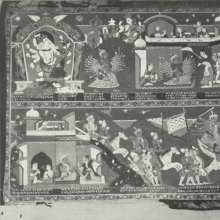Banasura, Bāṇāsura, Bana-asura: 5 definitions
Introduction:
Banasura means something in Hinduism, Sanskrit. If you want to know the exact meaning, history, etymology or English translation of this term then check out the descriptions on this page. Add your comment or reference to a book if you want to contribute to this summary article.
Images (photo gallery)
In Hinduism
Vaishnavism (Vaishava dharma)
Source: ISKCON Press: GlossaryBāṇāsura (बाणासुर).—A thousand-armed demon (asura) slain by Lord Kṛṣṇa.

Vaishnava (वैष्णव, vaiṣṇava) or vaishnavism (vaiṣṇavism) represents a tradition of Hinduism worshipping Vishnu as the supreme Lord. Similar to the Shaktism and Shaivism traditions, Vaishnavism also developed as an individual movement, famous for its exposition of the dashavatara (‘ten avatars of Vishnu’).
Purana and Itihasa (epic history)
Source: archive.org: Shiva Purana - English TranslationBāṇāsura (बाणासुर) refers to “Bāṇa-Asura”, according to the Śivapurāṇa 2.4.11 (“The Victory of Kumāra”).—Accordingly, as Krauñca said to Kārttikeya: “O Kumāra, O Skanda, O lord of gods, O slayer of the Asura Tāraka protect me who have sought refuge in you. I am harassed by the Asura Bāṇa (bāṇāsura). O Mahāsena, O lord, O merciful one, routed and uprooted from the battle with you he came and harassed me. Afflicted by him I have run from him and sought refuge in you. O lord of gods, born amongst the reeds, be merciful. O lord, please slay the Asura Bāṇa. Make me happy. You are the slayer of Asuras and a special saviour of the gods. You are a self-ruler. [...]”.
Source: Shodhganga: The saurapurana - a critical studyBāṇāsura (बाणासुर) or simply Bāṇa refers to the son of Bali and grandson of Virocana, according to one account of Vaṃśa (‘genealogical description’) of the 10th century Saurapurāṇa: one of the various Upapurāṇas depicting Śaivism.—Accordingly, Prahlāda ascended the throne [after Hiraṇyakaśipu]. His son was Virocana who was killed by Viṣṇu and his son Bali became the king. He was pious and virtuous and was bound to Pātalā by Viṣṇu. Bāṇāsura was the son of Bali, who was a devotee of Śiva. The Lord gave Bāṇāsura the status of the leader of a Gaṇa. The son’s of Bāṇa were Tāra, Śambara, Kapila, Śaṃkara, Svarbhānu and Vṛṣaparvan.

The Purana (पुराण, purāṇas) refers to Sanskrit literature preserving ancient India’s vast cultural history, including historical legends, religious ceremonies, various arts and sciences. The eighteen mahapuranas total over 400,000 shlokas (metrical couplets) and date to at least several centuries BCE.
General definition (in Hinduism)
Source: WikiPedia: HinduismBāṇāsura (बाणासुर): Banasura was a thousand-armed asura and son of Bali. He was a powerful and terrible asura. All people even the king of earth and Devas of heaven were afraid of him. Banasura was a follower of Siva. He had a beautiful daughter named Usha.
Languages of India and abroad
Sanskrit dictionary
Source: Cologne Digital Sanskrit Dictionaries: Monier-Williams Sanskrit-English DictionaryBāṇāsura (बाणासुर):—[from bāṇa] m. the Asura Bāṇa
Sanskrit, also spelled संस्कृतम् (saṃskṛtam), is an ancient language of India commonly seen as the grandmother of the Indo-European language family (even English!). Closely allied with Prakrit and Pali, Sanskrit is more exhaustive in both grammar and terms and has the most extensive collection of literature in the world, greatly surpassing its sister-languages Greek and Latin.
See also (Relevant definitions)
Starts with: Banasurapranahara, Banasuravadha, Banasuravijaya.
Full-text (+9): Anaupamya, Banasuravijaya, Banasuravadha, Shonitapura, Bana, Balasura, Indradamana, Kumbhanda, Vanasur, Totaka, Banapura, Kapila, Tara, Shambara, Vrishaparvan, Svarbhanu, Citralekha, Vanacuran, Shivastotra, Vanan.
Relevant text
Search found 17 books and stories containing Banasura, Bāṇāsura, Bana-asura, Bāṇa-asura; (plurals include: Banasuras, Bāṇāsuras, asuras). You can also click to the full overview containing English textual excerpts. Below are direct links for the most relevant articles:
Garga Samhita (English) (by Danavir Goswami)
Verse 1.7.8 < [Chapter 7 - Description of the Conquest of All Directions]
Verse 5.1.26 < [Chapter 1 - Advice to Kaṃsa]
Verse 1.7.12 < [Chapter 7 - Description of the Conquest of All Directions]
Brihad Bhagavatamrita (commentary) (by Śrī Śrīmad Bhaktivedānta Nārāyana Gosvāmī Mahārāja)
Verse 1.3.21-23 < [Chapter 3 - Prapañcātīta (beyond the Material Plane)]
Verse 1.4.31 < [Chapter 4 - Bhakta (the devotee)]
Verse 1.2.72-75 < [Chapter 2 - Divya (the celestial plane)]
Tiruvaymoli (Thiruvaimozhi): English translation (by S. Satyamurthi Ayyangar)
Pasuram 3.10.4 < [Section 10 - Tenth Tiruvaymoli (Canmam Palapala)]
Pasuram 7.4.9 < [Section 4 - Fourth Tiruvaymoli (Ali ela)]
Pasuram 6.4.8 < [Section 4 - Fourth Tiruvaymoli (Kuravai aycciyarotu)]
Puranic encyclopaedia (by Vettam Mani)
Chaitanya Bhagavata (by Bhumipati Dāsa)
Verse 2.19.148 < [Chapter 19 - The Lord’s Pastimes in Advaita’s House]
Verse 2.23.45-046 < [Chapter 23 - Wandering about Navadvīpa On the Day the Lord Delivered the Kazi]
Related products


